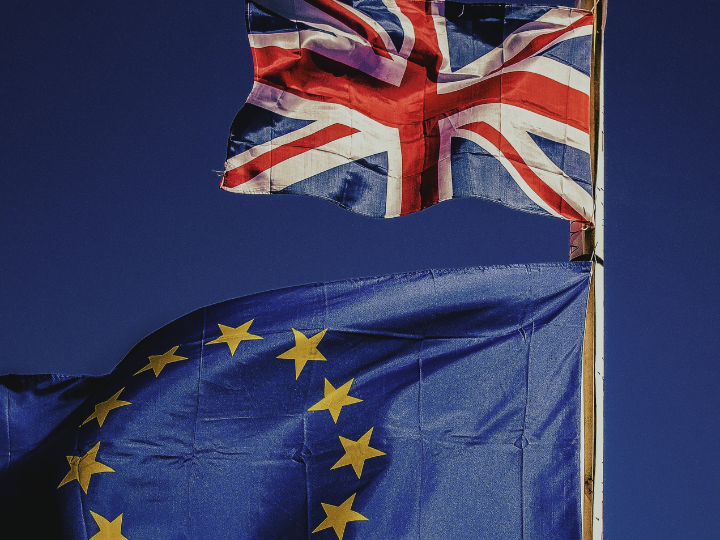by Giles Merritt*
Britain’s mood shift on Brexit has been much like Ernest Hemingway’s celebrated description of how bankruptcy occurs: “Two ways; gradually, then suddenly.” After six years of bitter division, pollsters now report that two-thirds of people they’ve interviewed say leaving the European Union was a mistake.
Remorse over Brexit has been further boosted by the abrupt resignation by former prime minister Boris Johnson of his parliamentary seat. Occasioned by scandal connected with the Covid pandemic, the departure of Brexit’s chief architect has fanned the flames of anti-Brexit sentiment.
Yet the UK’s two main political parties are still cautious about the sort of post-Brexit relationship they envisage with the EU. Both fear the outcome of next year’s expected general election may be decided by voters in the economically depressed ‘red wall’ constituencies of northern England that in 2016 voted overwhelmingly for Brexit.
In the governing Conservative party, the split between diehard ‘Brexiteers’ and more Europe-minded realists like prime minister Rishi Sunak is widening into a chasm. The latter half of the Tories’ 13 years in power has been marred not only by Brexit’s costs but also by incompetence, scandal and Covid, so their chances of re-election are dwindling fast.
The Labour party is increasingly confident of victory, but is wary of recanting its acceptance of ‘the people’s will’ on Brexit. Only the centrist Liberal Democrats are firmly in favour of a constructive new relationship with the EU, but as a political force they are handicapped by Britain’s archaic yet seemingly unchallengeable ‘first past the post’ electoral system.
The post-Brexit options available to future British governments have started to be debated in the more serious media. Most commentators nevertheless miss the point that it really won’t be up to the UK to decide. The basis of a new relationship will be determined in Brussels, not London, even though there are few signs on the EU side that much thought is being given to this.
So what sort of relations should be re-established? Although there’s a ‘once bitten twice shy’ sentiment in many EU capitals, there’s also a feeling that the Ukraine conflict demands a heightened security involvement that cannot be satisfied only by the UK’s membership of NATO.
As to trade, no one can say how far EU member states may wish to go towards re-admitting Britain to the single market and the customs union, although few if any want discredited former premier Boris Johnson’s surly and un-cooperative ‘Hard Brexit’ to persist.
The EU’s need to restore positive relations with Britain goes much further than security and defence. The UK is a major player in Europe despite the self-inflicted damage of Brexit. Frankfurt, Paris and Milan have benefitted to some degree from banking and financial services that have deserted the City of London, but the UK still remains a global hub for these.
Brexit’s disruption has been to no one’s advantage, which is why Europe’s major banks are pressuring the EU to allow London’s clearing houses the right to continue with euro-denominated transactions. A clear signpost towards a return to cross-channel cooperation on financial services has been the announcement of an EU-UK Financial Regulatory Forum.
The UK’s universities and high-tech companies are also an asset the EU undoubtedly wants to retain as a ‘European strength’ – hence Brussels’ willingness to bend over backwards in the ongoing discussions over Britain’s participation in the €95 billion-plus Horizon science and research programme. On both sides of the English Channel, Brexit has been a costly setback for business and industry, with damage limitation now the leitmotif in many sectors.
Less discussed elements of any new equation accommodating British and continental European interests are more nebulous, but no less important. Geopolitical considerations and the challenges that face the EU itself are going to be essential factors. Slogans like “Global Britain” have been shown to cut no ice for the UK in its dealings with China, while Brussels regrets the absence of the UK’s expertise and reputation in the Far East.
For all its faults and its reputation as the perpetual ‘awkward squad’ when it was in the EU, Britain in fact played a far more constructive and clear-headed role than it is nowadays credited with. An incoming Labour government in late 2024 or early 2025, possibly in tandem with the Liberal Democrats, will certainly want to negotiate a new treaty with the EU. It’s time for policymakers in Brussels and the national capitals to focus on its nature and content.
*Founder of Friends of Europe
*first published in: Friendsofeurope.org




 By: N. Peter Kramer
By: N. Peter Kramer

